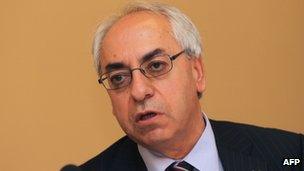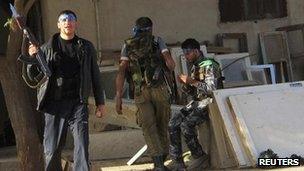Syria opposition groups hold crucial Qatar meeting
- Published

The SNC, headed by Abdulbaset Sayda, is seeking to widen its ranks
Syrian opposition groups have held their first day of talks in the Qatari capital Doha.
The meeting could reshape the Syrian National Council, the main opposition, into a possible government in exile, but differences are already apparent.
Rebel forces in Syria have criticised the SNC as out of touch, and the opposition is also split ideologically.
The talks come amid continuing violence in Syria, with reports of an explosion on Sunday near a hotel in Damascus.
Also on Sunday, opposition activists said that rebels had seized a major oilfield in the eastern Deir Ezzor province.
Young elements
The SNC is looking to broaden its ranks and agree on a common platform at the conference, the BBC's Jim Muir reports from Doha.
It is holding four days of intensive internal meetings aimed at overhauling its structures completely, our correspondent says, bringing in new, young elements closer to events on the ground, and producing a new leadership.
It is then scheduled to hold talks on Thursday with the Syrian National Initiative, a group of influential and respected opposition figures who are proposing the creation of a unified leadership body that would later produce a government in exile, possibly as early as next month.
Respected dissident Riad Seif is apparently being suggested by the US as the head of the new government in exile.
However, Mr Seif told the AFP news agency he had no plans to be leader.
"I shall not be a candidate to lead a government in exile... I am 66 and have health problems," he said.
Mr Seif said he does believe an alternative to the government of President Bashar al-Assad is "dearly needed".
However, the SNC has been critical of the reduced representation it would have in Mr Seif's planned new leadership group.
Mr Seif was among more than 20 opposition leaders who had gathered in Jordan on Thursday to hammer out proposals for the new leadership.
The participants there issued a statement to quell fears that they were planning to negotiate with President Assad.
"Assad and his entourage leaving power is a non-negotiable precondition for any dialogue aimed at finding a non-military solution, if that is still possible," the statement said.
'Oilfield seized'
The US is hoping the new leadership will help bring a successful conclusion to an uprising that is thought to have killed more than 36,000 people since protests against President Assad erupted in March 2011.

Rebels inside Syria have often been critical of the SNC
Earlier this week, American officials signalled the opposition needed to be expanded from just the SNC to take in more of those operating inside Syria.
Divisions have arisen not just between those in Syria and opposition figures abroad, but also between Islamist and secularist groups.
Representatives at Doha include various other religious and secular groupings, plus Kurdish figures and dissident members of Mr Assad's Alawite sect.
Inside Syria on Sunday, state television reported an explosion near the Dama Rose hotel in the capital, Damascus. Several people were wounded.
Also on Sunday, the UK-based opposition activist group, the Syrian Observatory for Human Rights, reported fierce clashes between government troops and rebels near a security building in Damascus.
The Observatory's director, Rami Abdel Rahman, also told AFP that rebels had seized al-Ward oilfield, east of the town of Mayadin in Deir Ezzor province, after a siege lasting several days.
He said this was first time the rebels had taken control of an oilfield.
On Saturday, rebels had attacked the strategically important Taftanaz base in the north with multiple rocket launchers, mortars and other weaponry.